Business Law 2 Assignment: Contracts, UCC, and HDC Analysis
VerifiedAdded on 2022/08/20
|6
|1659
|15
Homework Assignment
AI Summary
This document provides a comprehensive solution to a Business Law 2 assignment, addressing various aspects of contract law and the Uniform Commercial Code (UCC). The assignment covers topics such as offer and acceptance, the validity of contracts, and breach of contract scenarios. It also delves into the concept of title transfer in sales contracts, examining the impact of shipment contracts and the doctrine of frustration due to supervening impossibility. Furthermore, the assignment analyzes negotiable instruments, including promissory notes and endorsements, exploring the liabilities of different parties and the requirements for becoming a Holder in Due Course (HDC). Specific cases involving bankruptcy, qualified endorsements, and specific endorsements are examined. The assignment concludes with a discussion of holder rights and the implications of endorsements on checks, providing a complete overview of key concepts in business law.
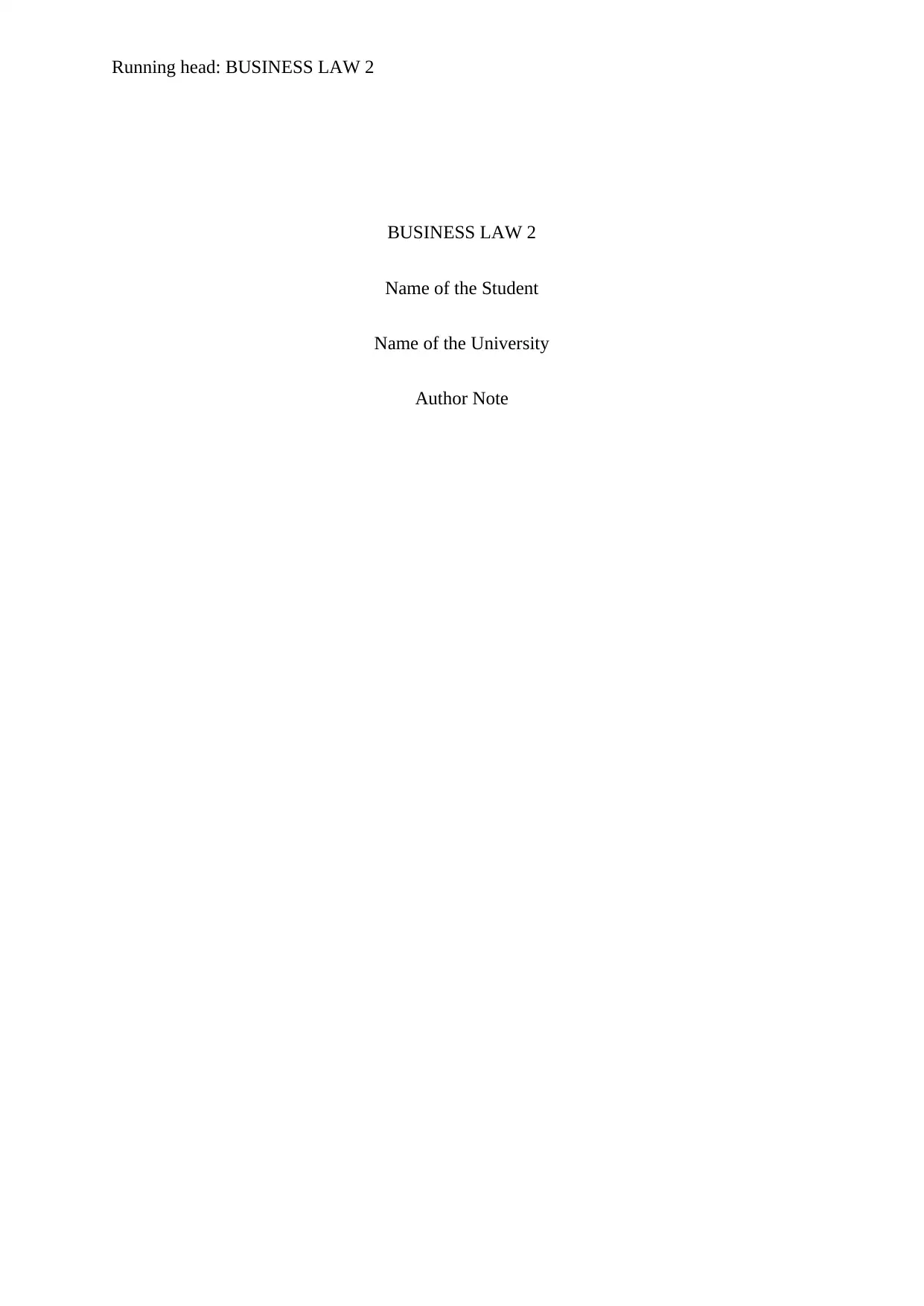
Running head: BUSINESS LAW 2
BUSINESS LAW 2
Name of the Student
Name of the University
Author Note
BUSINESS LAW 2
Name of the Student
Name of the University
Author Note
Paraphrase This Document
Need a fresh take? Get an instant paraphrase of this document with our AI Paraphraser
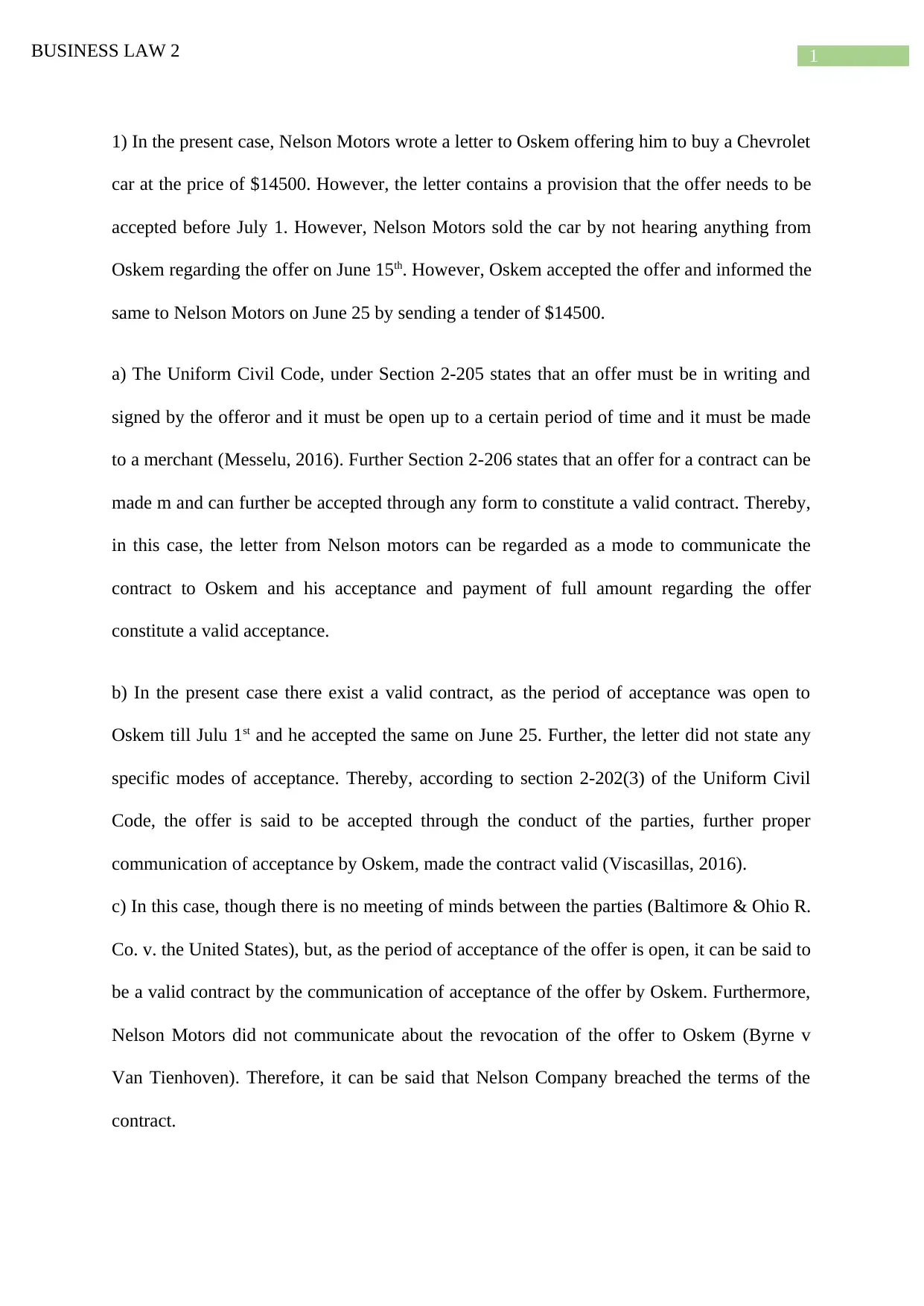
1BUSINESS LAW 2
1) In the present case, Nelson Motors wrote a letter to Oskem offering him to buy a Chevrolet
car at the price of $14500. However, the letter contains a provision that the offer needs to be
accepted before July 1. However, Nelson Motors sold the car by not hearing anything from
Oskem regarding the offer on June 15th. However, Oskem accepted the offer and informed the
same to Nelson Motors on June 25 by sending a tender of $14500.
a) The Uniform Civil Code, under Section 2-205 states that an offer must be in writing and
signed by the offeror and it must be open up to a certain period of time and it must be made
to a merchant (Messelu, 2016). Further Section 2-206 states that an offer for a contract can be
made m and can further be accepted through any form to constitute a valid contract. Thereby,
in this case, the letter from Nelson motors can be regarded as a mode to communicate the
contract to Oskem and his acceptance and payment of full amount regarding the offer
constitute a valid acceptance.
b) In the present case there exist a valid contract, as the period of acceptance was open to
Oskem till Julu 1st and he accepted the same on June 25. Further, the letter did not state any
specific modes of acceptance. Thereby, according to section 2-202(3) of the Uniform Civil
Code, the offer is said to be accepted through the conduct of the parties, further proper
communication of acceptance by Oskem, made the contract valid (Viscasillas, 2016).
c) In this case, though there is no meeting of minds between the parties (Baltimore & Ohio R.
Co. v. the United States), but, as the period of acceptance of the offer is open, it can be said to
be a valid contract by the communication of acceptance of the offer by Oskem. Furthermore,
Nelson Motors did not communicate about the revocation of the offer to Oskem (Byrne v
Van Tienhoven). Therefore, it can be said that Nelson Company breached the terms of the
contract.
1) In the present case, Nelson Motors wrote a letter to Oskem offering him to buy a Chevrolet
car at the price of $14500. However, the letter contains a provision that the offer needs to be
accepted before July 1. However, Nelson Motors sold the car by not hearing anything from
Oskem regarding the offer on June 15th. However, Oskem accepted the offer and informed the
same to Nelson Motors on June 25 by sending a tender of $14500.
a) The Uniform Civil Code, under Section 2-205 states that an offer must be in writing and
signed by the offeror and it must be open up to a certain period of time and it must be made
to a merchant (Messelu, 2016). Further Section 2-206 states that an offer for a contract can be
made m and can further be accepted through any form to constitute a valid contract. Thereby,
in this case, the letter from Nelson motors can be regarded as a mode to communicate the
contract to Oskem and his acceptance and payment of full amount regarding the offer
constitute a valid acceptance.
b) In the present case there exist a valid contract, as the period of acceptance was open to
Oskem till Julu 1st and he accepted the same on June 25. Further, the letter did not state any
specific modes of acceptance. Thereby, according to section 2-202(3) of the Uniform Civil
Code, the offer is said to be accepted through the conduct of the parties, further proper
communication of acceptance by Oskem, made the contract valid (Viscasillas, 2016).
c) In this case, though there is no meeting of minds between the parties (Baltimore & Ohio R.
Co. v. the United States), but, as the period of acceptance of the offer is open, it can be said to
be a valid contract by the communication of acceptance of the offer by Oskem. Furthermore,
Nelson Motors did not communicate about the revocation of the offer to Oskem (Byrne v
Van Tienhoven). Therefore, it can be said that Nelson Company breached the terms of the
contract.
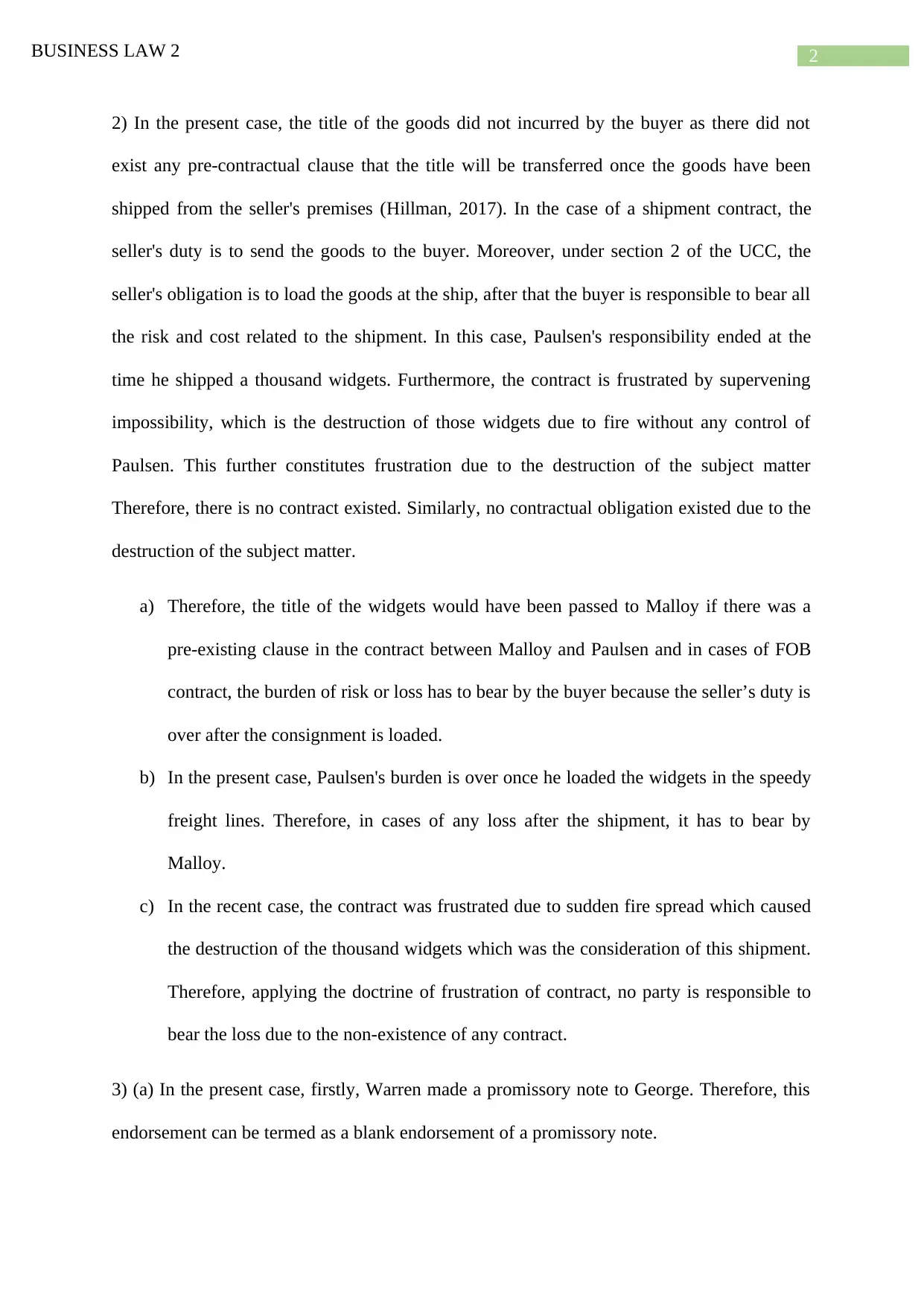
2BUSINESS LAW 2
2) In the present case, the title of the goods did not incurred by the buyer as there did not
exist any pre-contractual clause that the title will be transferred once the goods have been
shipped from the seller's premises (Hillman, 2017). In the case of a shipment contract, the
seller's duty is to send the goods to the buyer. Moreover, under section 2 of the UCC, the
seller's obligation is to load the goods at the ship, after that the buyer is responsible to bear all
the risk and cost related to the shipment. In this case, Paulsen's responsibility ended at the
time he shipped a thousand widgets. Furthermore, the contract is frustrated by supervening
impossibility, which is the destruction of those widgets due to fire without any control of
Paulsen. This further constitutes frustration due to the destruction of the subject matter
Therefore, there is no contract existed. Similarly, no contractual obligation existed due to the
destruction of the subject matter.
a) Therefore, the title of the widgets would have been passed to Malloy if there was a
pre-existing clause in the contract between Malloy and Paulsen and in cases of FOB
contract, the burden of risk or loss has to bear by the buyer because the seller’s duty is
over after the consignment is loaded.
b) In the present case, Paulsen's burden is over once he loaded the widgets in the speedy
freight lines. Therefore, in cases of any loss after the shipment, it has to bear by
Malloy.
c) In the recent case, the contract was frustrated due to sudden fire spread which caused
the destruction of the thousand widgets which was the consideration of this shipment.
Therefore, applying the doctrine of frustration of contract, no party is responsible to
bear the loss due to the non-existence of any contract.
3) (a) In the present case, firstly, Warren made a promissory note to George. Therefore, this
endorsement can be termed as a blank endorsement of a promissory note.
2) In the present case, the title of the goods did not incurred by the buyer as there did not
exist any pre-contractual clause that the title will be transferred once the goods have been
shipped from the seller's premises (Hillman, 2017). In the case of a shipment contract, the
seller's duty is to send the goods to the buyer. Moreover, under section 2 of the UCC, the
seller's obligation is to load the goods at the ship, after that the buyer is responsible to bear all
the risk and cost related to the shipment. In this case, Paulsen's responsibility ended at the
time he shipped a thousand widgets. Furthermore, the contract is frustrated by supervening
impossibility, which is the destruction of those widgets due to fire without any control of
Paulsen. This further constitutes frustration due to the destruction of the subject matter
Therefore, there is no contract existed. Similarly, no contractual obligation existed due to the
destruction of the subject matter.
a) Therefore, the title of the widgets would have been passed to Malloy if there was a
pre-existing clause in the contract between Malloy and Paulsen and in cases of FOB
contract, the burden of risk or loss has to bear by the buyer because the seller’s duty is
over after the consignment is loaded.
b) In the present case, Paulsen's burden is over once he loaded the widgets in the speedy
freight lines. Therefore, in cases of any loss after the shipment, it has to bear by
Malloy.
c) In the recent case, the contract was frustrated due to sudden fire spread which caused
the destruction of the thousand widgets which was the consideration of this shipment.
Therefore, applying the doctrine of frustration of contract, no party is responsible to
bear the loss due to the non-existence of any contract.
3) (a) In the present case, firstly, Warren made a promissory note to George. Therefore, this
endorsement can be termed as a blank endorsement of a promissory note.
⊘ This is a preview!⊘
Do you want full access?
Subscribe today to unlock all pages.

Trusted by 1+ million students worldwide
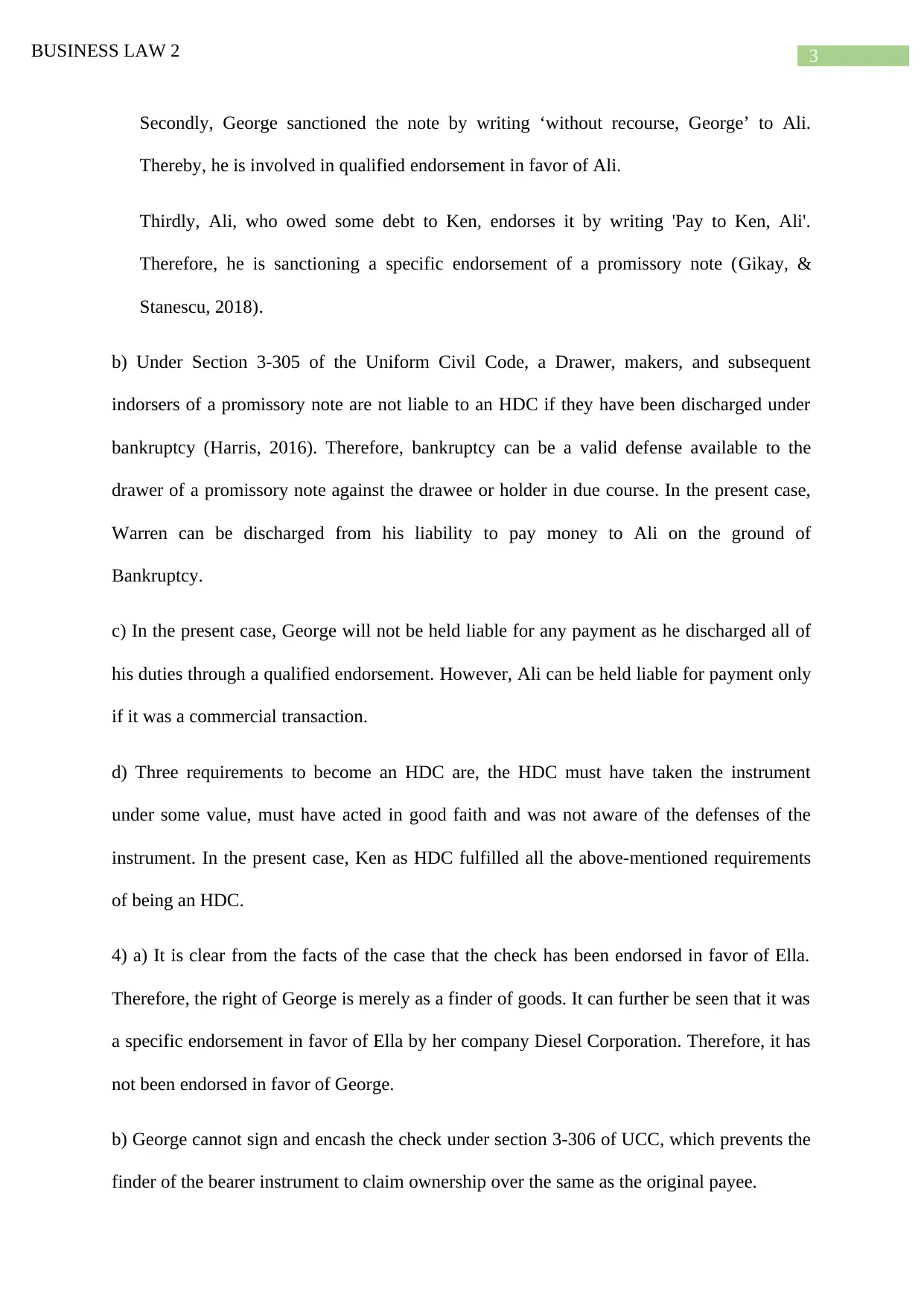
3BUSINESS LAW 2
Secondly, George sanctioned the note by writing ‘without recourse, George’ to Ali.
Thereby, he is involved in qualified endorsement in favor of Ali.
Thirdly, Ali, who owed some debt to Ken, endorses it by writing 'Pay to Ken, Ali'.
Therefore, he is sanctioning a specific endorsement of a promissory note (Gikay, &
Stanescu, 2018).
b) Under Section 3-305 of the Uniform Civil Code, a Drawer, makers, and subsequent
indorsers of a promissory note are not liable to an HDC if they have been discharged under
bankruptcy (Harris, 2016). Therefore, bankruptcy can be a valid defense available to the
drawer of a promissory note against the drawee or holder in due course. In the present case,
Warren can be discharged from his liability to pay money to Ali on the ground of
Bankruptcy.
c) In the present case, George will not be held liable for any payment as he discharged all of
his duties through a qualified endorsement. However, Ali can be held liable for payment only
if it was a commercial transaction.
d) Three requirements to become an HDC are, the HDC must have taken the instrument
under some value, must have acted in good faith and was not aware of the defenses of the
instrument. In the present case, Ken as HDC fulfilled all the above-mentioned requirements
of being an HDC.
4) a) It is clear from the facts of the case that the check has been endorsed in favor of Ella.
Therefore, the right of George is merely as a finder of goods. It can further be seen that it was
a specific endorsement in favor of Ella by her company Diesel Corporation. Therefore, it has
not been endorsed in favor of George.
b) George cannot sign and encash the check under section 3-306 of UCC, which prevents the
finder of the bearer instrument to claim ownership over the same as the original payee.
Secondly, George sanctioned the note by writing ‘without recourse, George’ to Ali.
Thereby, he is involved in qualified endorsement in favor of Ali.
Thirdly, Ali, who owed some debt to Ken, endorses it by writing 'Pay to Ken, Ali'.
Therefore, he is sanctioning a specific endorsement of a promissory note (Gikay, &
Stanescu, 2018).
b) Under Section 3-305 of the Uniform Civil Code, a Drawer, makers, and subsequent
indorsers of a promissory note are not liable to an HDC if they have been discharged under
bankruptcy (Harris, 2016). Therefore, bankruptcy can be a valid defense available to the
drawer of a promissory note against the drawee or holder in due course. In the present case,
Warren can be discharged from his liability to pay money to Ali on the ground of
Bankruptcy.
c) In the present case, George will not be held liable for any payment as he discharged all of
his duties through a qualified endorsement. However, Ali can be held liable for payment only
if it was a commercial transaction.
d) Three requirements to become an HDC are, the HDC must have taken the instrument
under some value, must have acted in good faith and was not aware of the defenses of the
instrument. In the present case, Ken as HDC fulfilled all the above-mentioned requirements
of being an HDC.
4) a) It is clear from the facts of the case that the check has been endorsed in favor of Ella.
Therefore, the right of George is merely as a finder of goods. It can further be seen that it was
a specific endorsement in favor of Ella by her company Diesel Corporation. Therefore, it has
not been endorsed in favor of George.
b) George cannot sign and encash the check under section 3-306 of UCC, which prevents the
finder of the bearer instrument to claim ownership over the same as the original payee.
Paraphrase This Document
Need a fresh take? Get an instant paraphrase of this document with our AI Paraphraser
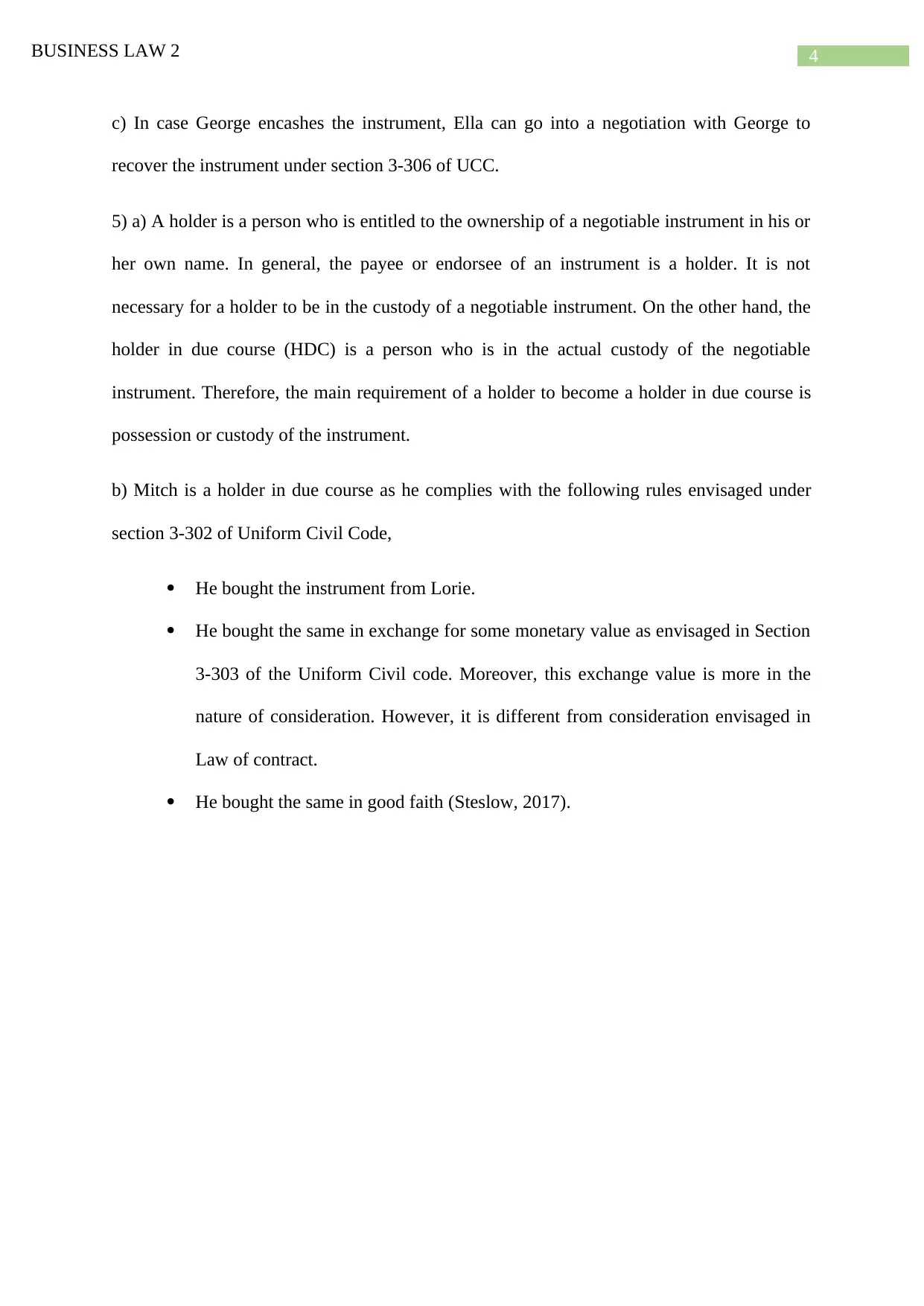
4BUSINESS LAW 2
c) In case George encashes the instrument, Ella can go into a negotiation with George to
recover the instrument under section 3-306 of UCC.
5) a) A holder is a person who is entitled to the ownership of a negotiable instrument in his or
her own name. In general, the payee or endorsee of an instrument is a holder. It is not
necessary for a holder to be in the custody of a negotiable instrument. On the other hand, the
holder in due course (HDC) is a person who is in the actual custody of the negotiable
instrument. Therefore, the main requirement of a holder to become a holder in due course is
possession or custody of the instrument.
b) Mitch is a holder in due course as he complies with the following rules envisaged under
section 3-302 of Uniform Civil Code,
He bought the instrument from Lorie.
He bought the same in exchange for some monetary value as envisaged in Section
3-303 of the Uniform Civil code. Moreover, this exchange value is more in the
nature of consideration. However, it is different from consideration envisaged in
Law of contract.
He bought the same in good faith (Steslow, 2017).
c) In case George encashes the instrument, Ella can go into a negotiation with George to
recover the instrument under section 3-306 of UCC.
5) a) A holder is a person who is entitled to the ownership of a negotiable instrument in his or
her own name. In general, the payee or endorsee of an instrument is a holder. It is not
necessary for a holder to be in the custody of a negotiable instrument. On the other hand, the
holder in due course (HDC) is a person who is in the actual custody of the negotiable
instrument. Therefore, the main requirement of a holder to become a holder in due course is
possession or custody of the instrument.
b) Mitch is a holder in due course as he complies with the following rules envisaged under
section 3-302 of Uniform Civil Code,
He bought the instrument from Lorie.
He bought the same in exchange for some monetary value as envisaged in Section
3-303 of the Uniform Civil code. Moreover, this exchange value is more in the
nature of consideration. However, it is different from consideration envisaged in
Law of contract.
He bought the same in good faith (Steslow, 2017).
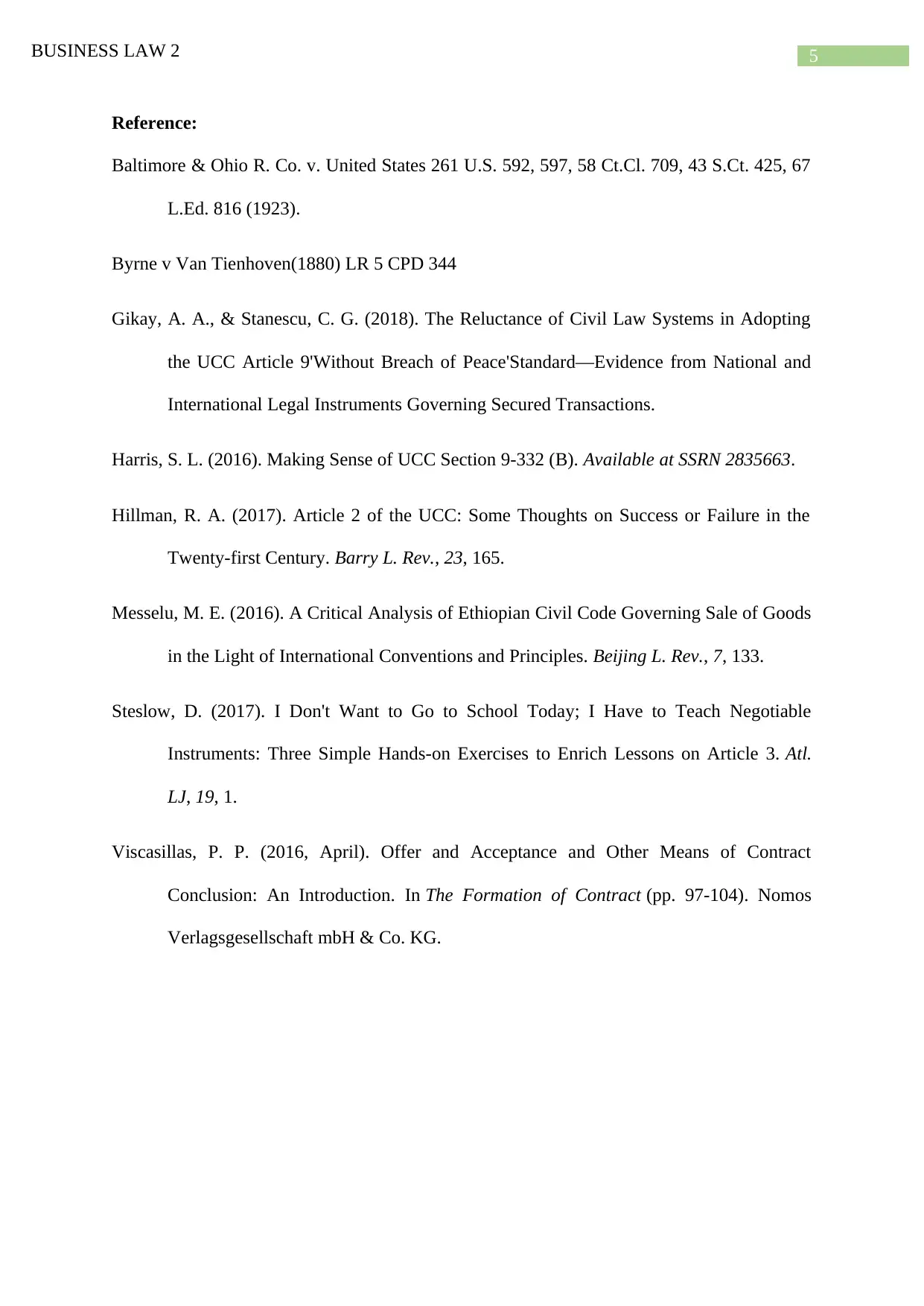
5BUSINESS LAW 2
Reference:
Baltimore & Ohio R. Co. v. United States 261 U.S. 592, 597, 58 Ct.Cl. 709, 43 S.Ct. 425, 67
L.Ed. 816 (1923).
Byrne v Van Tienhoven(1880) LR 5 CPD 344
Gikay, A. A., & Stanescu, C. G. (2018). The Reluctance of Civil Law Systems in Adopting
the UCC Article 9'Without Breach of Peace'Standard—Evidence from National and
International Legal Instruments Governing Secured Transactions.
Harris, S. L. (2016). Making Sense of UCC Section 9-332 (B). Available at SSRN 2835663.
Hillman, R. A. (2017). Article 2 of the UCC: Some Thoughts on Success or Failure in the
Twenty-first Century. Barry L. Rev., 23, 165.
Messelu, M. E. (2016). A Critical Analysis of Ethiopian Civil Code Governing Sale of Goods
in the Light of International Conventions and Principles. Beijing L. Rev., 7, 133.
Steslow, D. (2017). I Don't Want to Go to School Today; I Have to Teach Negotiable
Instruments: Three Simple Hands-on Exercises to Enrich Lessons on Article 3. Atl.
LJ, 19, 1.
Viscasillas, P. P. (2016, April). Offer and Acceptance and Other Means of Contract
Conclusion: An Introduction. In The Formation of Contract (pp. 97-104). Nomos
Verlagsgesellschaft mbH & Co. KG.
Reference:
Baltimore & Ohio R. Co. v. United States 261 U.S. 592, 597, 58 Ct.Cl. 709, 43 S.Ct. 425, 67
L.Ed. 816 (1923).
Byrne v Van Tienhoven(1880) LR 5 CPD 344
Gikay, A. A., & Stanescu, C. G. (2018). The Reluctance of Civil Law Systems in Adopting
the UCC Article 9'Without Breach of Peace'Standard—Evidence from National and
International Legal Instruments Governing Secured Transactions.
Harris, S. L. (2016). Making Sense of UCC Section 9-332 (B). Available at SSRN 2835663.
Hillman, R. A. (2017). Article 2 of the UCC: Some Thoughts on Success or Failure in the
Twenty-first Century. Barry L. Rev., 23, 165.
Messelu, M. E. (2016). A Critical Analysis of Ethiopian Civil Code Governing Sale of Goods
in the Light of International Conventions and Principles. Beijing L. Rev., 7, 133.
Steslow, D. (2017). I Don't Want to Go to School Today; I Have to Teach Negotiable
Instruments: Three Simple Hands-on Exercises to Enrich Lessons on Article 3. Atl.
LJ, 19, 1.
Viscasillas, P. P. (2016, April). Offer and Acceptance and Other Means of Contract
Conclusion: An Introduction. In The Formation of Contract (pp. 97-104). Nomos
Verlagsgesellschaft mbH & Co. KG.
⊘ This is a preview!⊘
Do you want full access?
Subscribe today to unlock all pages.

Trusted by 1+ million students worldwide
1 out of 6
Related Documents
Your All-in-One AI-Powered Toolkit for Academic Success.
+13062052269
info@desklib.com
Available 24*7 on WhatsApp / Email
![[object Object]](/_next/static/media/star-bottom.7253800d.svg)
Unlock your academic potential
Copyright © 2020–2026 A2Z Services. All Rights Reserved. Developed and managed by ZUCOL.




